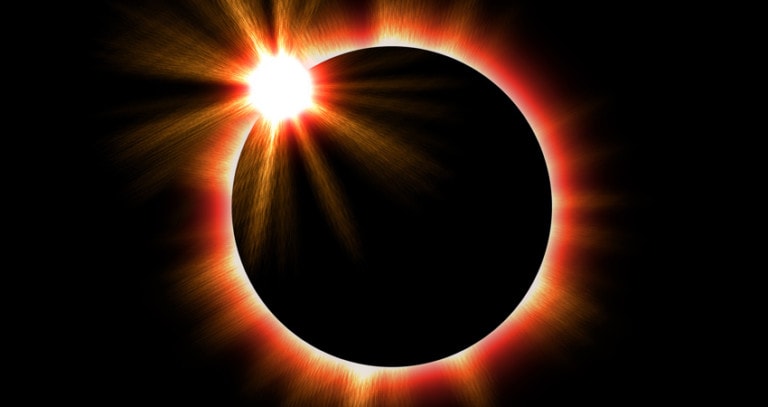On August 21, 2017, skywatchers are going to be able to experience a sight that hasn’t been visible in over 20 years: a solar eclipse. While most of the country will see a partial eclipse to varying degrees, the lucky residents within a certain 70-mile-wide path that stretches across the country will get to experience a total eclipse. Whether you’re taking a special scientific vacation or planning to view the eclipse from your own backyard, it’s important to be aware of the affects a solar eclipse can have on your eyes. Failure to use the right viewing tools can result in serious damage to your eyes.
How Does an Eclipse Happen?
As the earth travels around the sun, the moon constantly travels around the earth. Once in a great while these bodies line up in a way that the moon is between the earth and the sun. As it travels across the face of the sun, it covers the sun to a greater and lesser extent. From the earth’s viewpoint, it looks like a black disc is sliding across the face of the sun. During a total eclipse, the sun is blacked out except for bright flares around the black moon. The disc will continue to move on, covering less and less of the sun until it’s moved on.
The Need for Eye Protection
Looking directly into the sun at any time is dangerous, and can cause damage to your eyesight. During an eclipse, the moon covers so much of the sun that it dims the resulting light, making it seem like the sun is faint enough to look at. This isn’t true: the part of the sun that’s not covered up is just as strong. It’s an unusual sight that people naturally want to see, but it’s dangerous to look at it unless you’re wearing the right kind of eye protection.
NASA has partnered with the American Astronomical Society to determine the right kind of protection needed for eclipse watching. Follow these rules for the safest viewing:
- Make sure the lenses are marked with an ISO 12312-2 international standard
- They must have the manufacturer’s name and address printed somewhere on the lens or lens holder
- Don’t use older viewers saved from past partial eclipses
- Never use sunglasses, even the darkest ones you own
- If your lenses are scratched or wrinkled, throw them away and get new ones
- Don’t use a welding hood unless it’s a #14 lens or darker
While we won’t get to see a total eclipse here in Jacksonville, FL, we’ll be close; we’re predicted to get a 90 percent totality in our community. At Florida Eye Specialists, our entire team is looking forward to safely viewing the eclipse right along with our patients. If you’ve got eclipse questions or want to make an appointment, call our office at 904-564-2020 today.

